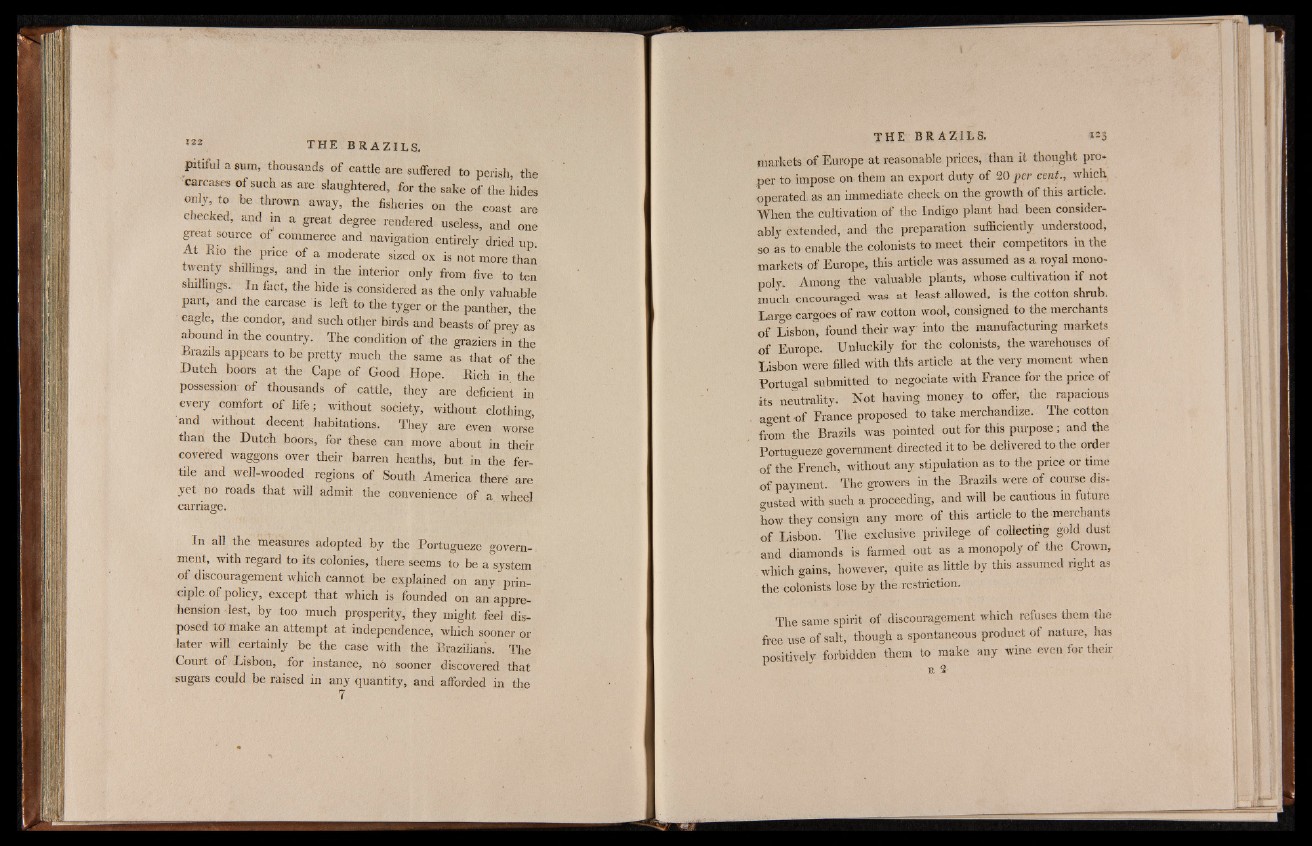
pitiful a sum, thousands of cattle are suffered to perish, the
carcases of such as are slaughtered, for the sake of the hides
only to be thrown away, the fisheries on the coast are
checked, and m a great degree rendered useless, and one
great source of commerce and navigation entirely dried up.
At Rio the price of a moderate sized ox is not more than
twenty shillings, and in the interior only from five to ten
shillings. In fact, the hide is considered as the only valuable
part, and the carcase is left to the tyger or the panther, the
eagle, the condor, and such other birds and beasts of prey as
abound in the country. The condition of the graziers in the
Brazils appears to be pretty much the same as that of the
Dutch boors at the Cape of Good Hope. Rich in the
possession of thousands of cattle, they are deficient in
every comfort of life; without society, without clothing
and without decent habitations. They are even worse
than the Dutch boors, for these can move about in their
covered waggons over their barren heaths, but in the fertile
and well-wooded regions of South America there are
yet no roads that will admit the convenience of a wheel
carriage.
In all the measures adopted by the Portugueze government,
with regard to its colonies, there seems to be a system
of discouragement which cannot be explained on any principle
of policy, except that which is founded on an apprehension
lest, by too much prosperity, they might feel disposed
to; make an attempt at independence, which sooner or
later will certainly be the case with the Brazilians. The
Court of Lisbon, for instance, no sooner discovered that
sugars could be raised in any quantity, and afforded in the
7
markets of Europe at reasonable prices, than it thought proper
to impose on them an export duty of 20 per cent., which
operated, as an immediate check on the growth of this article.
When the cultivation of the Indigo plant had been considerably
extended, and the preparation sufficiently understood,
so as to enable the colonists to meet their competitors in the
markets of Europe, this article was assumed as a royal monopoly.
Among the valuable plants, whose cultivation if not
much encouraged was at least allowed, is the cotton shrub.
Large cargoes of raw cotton wool, consigned to the merchants
of Lisbon, found their way into the manufacturing markets
of Europe. Unluckily for the colonists, the warehouses of
Lisbon were filled with this article a t the very moment when
Portugal submitted to negocíate with France for the price of
its neutrality. Not having money to offer, the rapacious
agent -of France proposed to take merchandize. The cotton
from the Brazils was pointed out for this purpose; and the
Portugueze government directed it to be delivered to the order
of the French, without any stipulation as to the price or time
of payment. The growers in the Brazils were of course disgusted
with such a proceeding, and will be cautious in future
how they consign any more of this article to the merchants
of Lisbon. The exclusive privilege of collecting gold dust
and diamonds is farmed out as a monopoly of the Crown,
which gains, however, quite as little by this assumed right as
the colonists lose by the restriction.
The same spirit of discouragement which refuses them the
free use of salt, though a spontaneous product of nature, has
positively forbidden them to make any wine even for their
b. 2